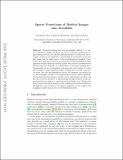Sparse Projections of Medical Images onto Manifolds
Author(s)
Chen, George; Wachinger, Christian; Golland, Polina
DownloadGolland_Sparse projections.pdf (1.360Mb)
OPEN_ACCESS_POLICY
Open Access Policy
Creative Commons Attribution-Noncommercial-Share Alike
Terms of use
Metadata
Show full item recordAbstract
Manifold learning has been successfully applied to a variety of medical imaging problems. Its use in real-time applications requires fast projection onto the low-dimensional space. To this end, out-of-sample extensions are applied by constructing an interpolation function that maps from the input space to the low-dimensional manifold. Commonly used approaches such as the Nyström extension and kernel ridge regression require using all training points. We propose an interpolation function that only depends on a small subset of the input training data. Consequently, in the testing phase each new point only needs to be compared against a small number of input training data in order to project the point onto the low-dimensional space. We interpret our method as an out-of-sample extension that approximates kernel ridge regression. Our method involves solving a simple convex optimization problem and has the attractive property of guaranteeing an upper bound on the approximation error, which is crucial for medical applications. Tuning this error bound controls the sparsity of the resulting interpolation function. We illustrate our method in two clinical applications that require fast mapping of input images onto a low-dimensional space.
Date issued
2013Department
Massachusetts Institute of Technology. Computer Science and Artificial Intelligence Laboratory; Massachusetts Institute of Technology. Department of Electrical Engineering and Computer ScienceJournal
Information Processing in Medical Imaging
Publisher
Springer-Verlag Berlin Heidelberg
Citation
Chen, George H., Christian Wachinger, and Polina Golland. “Sparse Projections of Medical Images onto Manifolds.” In Information Processing in Medical Imaging, Springer-Verlag (Lecture Notes in Computer Science; 7917) (2013): 292–303.
Version: Original manuscript
ISBN
978-3-642-38867-5
978-3-642-38868-2
ISSN
0302-9743
1611-3349